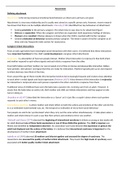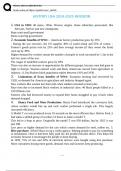Concepts of Epidemiology Raj Bhopal
1. What is epidemiology?
The nature and scope of a biological, social, and ecological science and of epidemiological variables
and outcomes.
1.1 The individual and the population
The population pattern of disease is not solely dependent on the characteristics of individuals but also
on the interaction between individuals with each other and the environment in which they live. The
population has a pattern of disease arising from its intrinsic social characteristics. If society or the
environment changed, the individual’s risk of disease would also change, even when the individual
resists change personally. Patterns of diseases in populations, therefore, result from the
characteristics of individuals, societies and environment.
1.2 Definition of epidemiology and statement of its central paradigm
The term epidemiology is derived from the Greek words meaning study upon populations (epi =
upon, demos = people, ology = study).
Epidemiology = the science and craft that studies the pattern of diseases (and health, though
usually indirectly) in populations to help understand both their causes and the burden they
impose. This information is applied to prevent, control or manage the problems under study.
The central paradigm of epidemiology is that patterns of disease in populations may be analyzed
systematically to provide understanding of the causes and control of disease. The key strategy, then,
of epidemiology is to seek out the differences and similarities (‘compare and contrast’) in the disease
patterns of populations to gain new knowledge.
1.3 Directions in epidemiology and its uses
Modern epidemiology is becoming more than a science; it is becoming a craft, vocation and
profession; a partner of public health, not just a science of public health. Currently epidemiology is
seen as useful in:
yielding understanding of what causes or sustains disease in populations;
preventing and controlling disease in populations;
guiding health and healthcare policy and planning;
assisting in the management and care of health and disease in individuals.
1.4 Epidemiology as a science, practice, and craft
Dictionary definitions of science tend to be complex such as:
1. the observation, identification, description, experimental investigation, and theoretical
explanation of phenomena
2. such activities restricted to a class of natural phenomena
3. any branch of knowledge based on systematic observations of facts and seeking to formulate
general explanatory laws and hypotheses that could be verified empirically.
Science is a creative endeavor and relies as much on questioning, imagination and exploration as art,
but the difference is that science tests out its ideas by seeking empirical evidence rooted in the
natural world.
The idea, the question, the testable hypothesis, the research test, and the interpretation of
the research data to advance understanding of natural phenomena, together, comprise science.
Epidemiology studies the nature of disease, and their causes, and it uses systematic methods of
measurement to test ideas, questions and hypotheses, and hence it is a bio-science, serving medicine
and public health just as medical sciences such as pathology and microbiology do.
, In short, epidemiology studies disease within a cultural context, and is particularly concerned
with social organization. Epidemiology is, therefore, not only a bio-science but also a social science.
Populations exist in a physical environment, which is a dominant force in determining health.
While many epidemiologists are simultaneously engaged in both theoretical and practical
applications, usually in public health but sometimes in clinical and laboratory medicine, some are
wholly occupied in applying available knowledge. This applied work is not science, though it draws
upon science. In this regard, epidemiology is no different to, for example, geology and chemistry,
where there are scientists and practitioners, and often the two roles are combined. Scientific research
and practice in epidemiology are symbiotic, but not synonymous, activities.
1.5 The nature of epidemiological variables
Epidemiological variables aid in the depiction, analysis, and interpretation of difference in disease
patterns within and between populations. Analysis of disease by age, sex, economic status, social
class, occupation, country of residence, country of birth, region of residence, and racial or ethnic
classification are all powerful ways of showing variations in a broad range of diseases and health
states.
A good epidemiological variable should:
have an impact on health in individuals and populations;
be measurable accurately;
differentiate populations in their experience of disease or health;
differentiate populations in some underlying characteristic relevant to health e.g. income,
childhood circumstance, hormonal status, genetic inheritance, or behavior relevant to
health;
generate testable aetiological hypotheses, and/or
o help to develop health policy, and/or
o help to plan and deliver health care, and/or
o help to prevent and control disease.
1.6 A disease and health problem: an illustration of the interdependence of clinical
medicine and epidemiology
Investigating the causes and understanding the means to control the problem is, in essence, the
science of epidemiology and taking the steps to prevent and control the problem, including providing
the appropriate health services is, in essence, public health.
Public health (medicine) = n activity to which many contribute, most usually defined as the
science and art of prolonging life, preventing disease and promoting health through the
organized efforts of society. Public health medicine is one of the many names given to the
specialty of medical doctors who focus on public health.
For the purposes of scientific investigation, a definition which includes people with a high probability
of disease is likely to be better than one which includes many people without. For public health action
the same definition may be inadequate, for it underestimates the size of the problem and misses the
people most likely to benefit: those with early symptoms.
Information on causation based on population studies may be used by the clinician in
managing the individual patient. Therapeutic ideas may be sparked by understanding of causation
and tested on populations of patients. The results derived from populations will then be applied to
individuals.
1.7 Seeking the theoretical foundations of epidemiology
The main epidemiological theories and principles that have guided this chapter include these:
Disease in populations is more than the sum of the disease in individuals.
Populations differ in their disease experience.
Disease experiences within populations differ in subgroups of the population.
1. What is epidemiology?
The nature and scope of a biological, social, and ecological science and of epidemiological variables
and outcomes.
1.1 The individual and the population
The population pattern of disease is not solely dependent on the characteristics of individuals but also
on the interaction between individuals with each other and the environment in which they live. The
population has a pattern of disease arising from its intrinsic social characteristics. If society or the
environment changed, the individual’s risk of disease would also change, even when the individual
resists change personally. Patterns of diseases in populations, therefore, result from the
characteristics of individuals, societies and environment.
1.2 Definition of epidemiology and statement of its central paradigm
The term epidemiology is derived from the Greek words meaning study upon populations (epi =
upon, demos = people, ology = study).
Epidemiology = the science and craft that studies the pattern of diseases (and health, though
usually indirectly) in populations to help understand both their causes and the burden they
impose. This information is applied to prevent, control or manage the problems under study.
The central paradigm of epidemiology is that patterns of disease in populations may be analyzed
systematically to provide understanding of the causes and control of disease. The key strategy, then,
of epidemiology is to seek out the differences and similarities (‘compare and contrast’) in the disease
patterns of populations to gain new knowledge.
1.3 Directions in epidemiology and its uses
Modern epidemiology is becoming more than a science; it is becoming a craft, vocation and
profession; a partner of public health, not just a science of public health. Currently epidemiology is
seen as useful in:
yielding understanding of what causes or sustains disease in populations;
preventing and controlling disease in populations;
guiding health and healthcare policy and planning;
assisting in the management and care of health and disease in individuals.
1.4 Epidemiology as a science, practice, and craft
Dictionary definitions of science tend to be complex such as:
1. the observation, identification, description, experimental investigation, and theoretical
explanation of phenomena
2. such activities restricted to a class of natural phenomena
3. any branch of knowledge based on systematic observations of facts and seeking to formulate
general explanatory laws and hypotheses that could be verified empirically.
Science is a creative endeavor and relies as much on questioning, imagination and exploration as art,
but the difference is that science tests out its ideas by seeking empirical evidence rooted in the
natural world.
The idea, the question, the testable hypothesis, the research test, and the interpretation of
the research data to advance understanding of natural phenomena, together, comprise science.
Epidemiology studies the nature of disease, and their causes, and it uses systematic methods of
measurement to test ideas, questions and hypotheses, and hence it is a bio-science, serving medicine
and public health just as medical sciences such as pathology and microbiology do.
, In short, epidemiology studies disease within a cultural context, and is particularly concerned
with social organization. Epidemiology is, therefore, not only a bio-science but also a social science.
Populations exist in a physical environment, which is a dominant force in determining health.
While many epidemiologists are simultaneously engaged in both theoretical and practical
applications, usually in public health but sometimes in clinical and laboratory medicine, some are
wholly occupied in applying available knowledge. This applied work is not science, though it draws
upon science. In this regard, epidemiology is no different to, for example, geology and chemistry,
where there are scientists and practitioners, and often the two roles are combined. Scientific research
and practice in epidemiology are symbiotic, but not synonymous, activities.
1.5 The nature of epidemiological variables
Epidemiological variables aid in the depiction, analysis, and interpretation of difference in disease
patterns within and between populations. Analysis of disease by age, sex, economic status, social
class, occupation, country of residence, country of birth, region of residence, and racial or ethnic
classification are all powerful ways of showing variations in a broad range of diseases and health
states.
A good epidemiological variable should:
have an impact on health in individuals and populations;
be measurable accurately;
differentiate populations in their experience of disease or health;
differentiate populations in some underlying characteristic relevant to health e.g. income,
childhood circumstance, hormonal status, genetic inheritance, or behavior relevant to
health;
generate testable aetiological hypotheses, and/or
o help to develop health policy, and/or
o help to plan and deliver health care, and/or
o help to prevent and control disease.
1.6 A disease and health problem: an illustration of the interdependence of clinical
medicine and epidemiology
Investigating the causes and understanding the means to control the problem is, in essence, the
science of epidemiology and taking the steps to prevent and control the problem, including providing
the appropriate health services is, in essence, public health.
Public health (medicine) = n activity to which many contribute, most usually defined as the
science and art of prolonging life, preventing disease and promoting health through the
organized efforts of society. Public health medicine is one of the many names given to the
specialty of medical doctors who focus on public health.
For the purposes of scientific investigation, a definition which includes people with a high probability
of disease is likely to be better than one which includes many people without. For public health action
the same definition may be inadequate, for it underestimates the size of the problem and misses the
people most likely to benefit: those with early symptoms.
Information on causation based on population studies may be used by the clinician in
managing the individual patient. Therapeutic ideas may be sparked by understanding of causation
and tested on populations of patients. The results derived from populations will then be applied to
individuals.
1.7 Seeking the theoretical foundations of epidemiology
The main epidemiological theories and principles that have guided this chapter include these:
Disease in populations is more than the sum of the disease in individuals.
Populations differ in their disease experience.
Disease experiences within populations differ in subgroups of the population.






